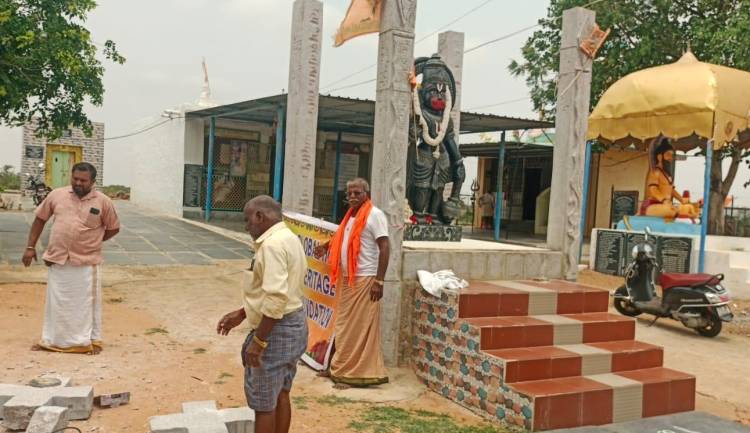[GHHF] Helping to build Hanuman Temple in Hanimireddi Palli near Anantapur.
[GHHF] Helping to build Hanuman Temple in Hanimireddi Palli near Anantapur.
 "Hinduism is the one world religion that reaches out to embrace other faiths with respect, a welcome change from groups who expend enormous amounts of energy condemning the sincere beliefs of others. There is no eternal damnation in Hinduism because Hindus believe absolutely no one is excluded from divine grace.” Linda Johnsen
"Hinduism is the one world religion that reaches out to embrace other faiths with respect, a welcome change from groups who expend enormous amounts of energy condemning the sincere beliefs of others. There is no eternal damnation in Hinduism because Hindus believe absolutely no one is excluded from divine grace.” Linda Johnsen
Global Hindu Heritage Foundation is very happy to announce that we have agreed to help the villagers of Hanimiraddi Palli Village in Kalyandurg area. Over the last two years we visited the nearby Hindu Temple to meet with reconverted Hindus and celebrate their return, at that time, the villagers approached us requested to help build the Temple. Hanuman Statue is already established which is on the highway where people can stop and pray. We have seen a lot of people visit Hanumanji. It is in an open area. They requested us to complete the Temple structure.
As will know that Hindu temples hold immense significance in Hinduism, serving as sacred spaces where devotees connect with the divine. It is more than a physical structure; it is a destination for many people to grow spiritually and perform numerous rituals to fulfill their religious need. A Hindu Temple encourages reflection, purification of mind, fulfill the religious needs and help develop devotional pursuits.
Hindu Temples carry shakti that awakened masters as well as masses to shower the blessings. The blessings can heal a person; they can answer questions; they can empower people’s efforts, and they can stimulate spiritual initiation or awakening for sincere seekers. Through the mystical science of Temple construction, these blessings can be housed, preserved, and maintained over centuries so that a person need not read the Yoga Sutras of Patanjali to learn Yoga nor know the science behind the construction of the Temple.
Historically, temples in India served as centers of worship, spiritual practice, and community gatherings. Initially, they were built as simple structures and later evolved into more elaborate and intricate architectural marvels. Temples were patronized by kings, rulers, and wealthy individuals who sponsored their construction and supported the temple communities. Regional and dynastic styles influence the design of temples of ancient India.
Temples in India are designed and built according to ancient Vedic ideals that emphasise harmony, symmetry, and balance. Temples are frequently created by precise standards, such as the Vaastu Shastra, which describes the principles of temple construction, such as temple orientation, deity placement, and the use of holy geometry.
Temples also serve as community gathering places, where people come together to celebrate festivals, perform charitable acts, and engage in other social and cultural activities. It also plays a key role in social welfare activities like feeding the needy, providing education, and supporting people with disabilities and sickness. (Source: novatr)
Your donations are appreciated;
By Zelle: ghhfusaorg@gmail.com
PayPal: savetemples.org
By Check: Or you can send a check payable to GHHF, 14726 Harmony Lane, Frisco, TX 75035.
It is tax-deductible.
By Rupees: call 601-918-7111; +91 83096 43979.





















 Urgent support needed for Bangladesh Hindus
Urgent support needed for Bangladesh Hindus 







